AIDA-AGRI Joint Public Hearing on “Artificial intelligence in agriculture and food security”
Tags:
Dr. Steven Davy, Head Of Division for Programmable Autonomous Systems at Walton Institute was invited to present at the AIDA-AGRI joint public hearing on Artificial Intelligence in agriculture and food security. The topic of discussion on the panel was “How can AI promote the transition towards a smarter and more sustainable future agriculture?”
Below is a summary of the presentation from Dr Davy to the European Parliament.
There is no doubt that the application of AI in agriculture can have tremendous benefits to EU citizens and businesses in the not too distance future. AI can bring about a more sustainable future to agriculture; however, there are major obstacles that need to be tackled before we can unlock its fullest potential.
The Horizon 2020 project CYBELE, and we focus on making AI more accessible to agritech businesses, to make it easier for them to bring AI powered products to market. CYBELE focuses on nine use cases that reach right across the spectrum of agriculture to demonstrate how AI can improve productivity, reduce waste, improve yield and improve food safety.

For example, the project is using UAVs and drone video imagery to estimate and predict the bio mass on wheat farms in Scotland, by using computer vision models that can process farm images in real-time to help farmers to more efficiently run their businesses. Likewise, it is using drone images of fish farms in Corfu to ensure fish tanks are optimally placed, saving fish farm managers countless hours in manual labour. Partners are using frost predictions models for fruit growers in Spain to help them to take proactive actions to protect their crops from being spoiled. AI is being used to process satellite images of soya bean farms so that farmers can selectively harvest high protein crops, so they can earn more revenue based on higher grade produce. Finally AI on pig farms is being used to be able to estimate the live weight of pigs, and to monitor pig welfare, so that farm managers can care for their animals more effectively, and increase quality and quantity of meat being produced.
In a wider context AI is being used to make farming practices more sustainable by helping in cutting the use of fertilisers, making more efficient use of water, increasing shelf life of produce, speeding up the supply chain and further reducing food waste. Much of the research and innovation for this is being carried out across Europe, in projects such as SmartAgriHubs, Horizon 2020 DEMETER, AgRoboFood among many others.
CYBELE fully recognises that AI can bring benefits to EU citizens and EU agri businesses, and also recognises that there is a significant gap in skills and knowledge related to AI in the agri food sector. Its approach to tackle this problem is to develop software tools that help data scientists to harness the power of Europe’s high performance computers as a platform for AI.
The project also recognises that there are hurdles surrounding the adoption of AI in the agriculture sectors. Firstly, there is a lack of concrete Return on Investment of AI in agriculture, which CYBELE aims to address directly, by bringing success stories to the fore.
Secondly, there is a reluctance in the agriculture sector to embrace new technologies, primarily due to the low margins involved, and the costs of adoption. Investment in education in the agri sector on how AI can bring sustainable and transformative changes to the sector should be a priority in the short term. Uptake and use of AI powered technologies should be incentivised for EU agri businesses and not seen as a cost to their bottom line.
The widespread application and adoption of AI in agriculture is in its infancy, and challenges related to AI techniques need to be also addressed. AI must be responsible, ethical and trustworthy. AI needs to become explainable, so that farmers can fully understand the advice that AI algorithms are supplying them. AI needs to become more energy efficient, and reverse the trend of doubling energy usage every 3-4 months.
Finally, over the next few short years, there will be leaps and bounds in the advancement of AI, Europe must ensure that these advancements are suitable for adoption in the agricultural sector, and that these technologies can bring about sustainable change in food production.




